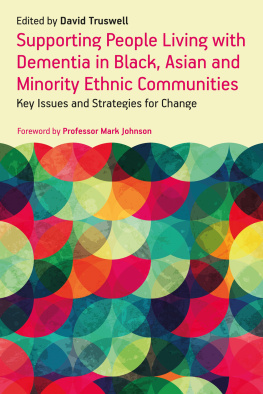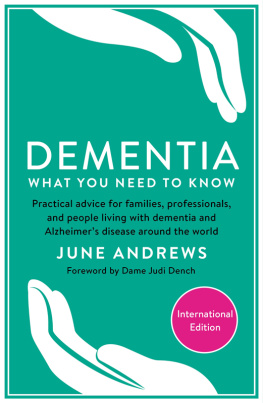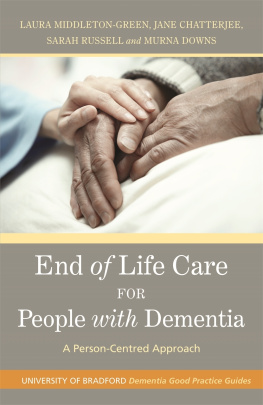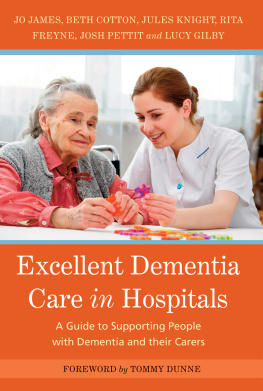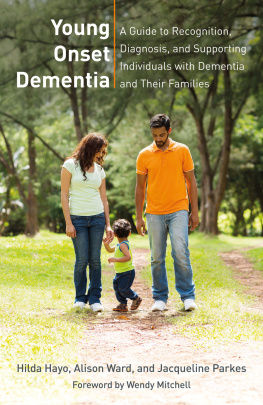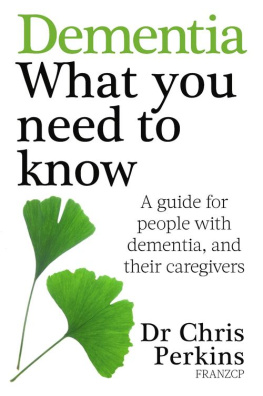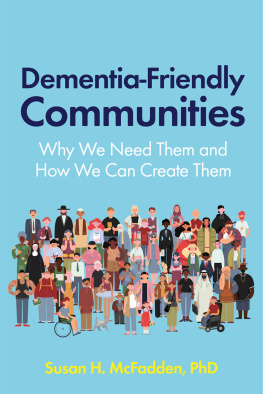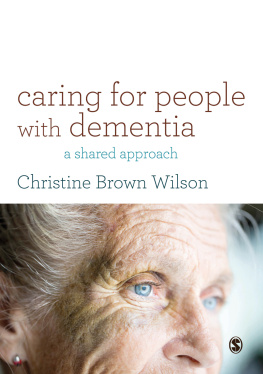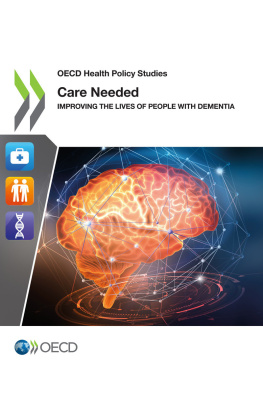
Supporting People with
Dementia in Black, Asian
and Minority Ethnic Communities
Key Issues and Strategies for Change
Edited by David Truswell
Foreword by Professor Mark Johnson

Jessica Kingsley Publishers
London and Philadelphia
Contents
Foreword
Professor Emeritus Mark R. D. Johnson
UK Centre for Evidence in Ethnicity Health & Diversity
Mary Seacole Research Centre, De Montfort University Leicester
David Truswell and his colleagues are to be congratulated on producing a unique resource a reader of material relating to dementia among the UKs Black, Asian and minority ethnic (BAME) communities of migrant origin, which combines rigorous academic research, comprehensive reviewing of the relevant literature, and insights based on community views involving both carers and people living with dementia, from a selection of the main groups of the population represented within that broad label. Not before time, they have corrected a historic omission and injustice in the literature on which the design and provision of our health and care services are based. In a sense, this represents a coming of age for the literature on ethnic health since the times when the predominant issue was the fear of infection from migrants, a fear that remains, however unjustified (Bivins 2015). This was followed by a period where blame was placed on the migrants for failing to understand the national health system or for following exotic cultural behaviours, and a more recent period when attempts were beginning to be made to train healthcare professionals in cultural competence. As the earlier migrants who formed the basis of our post-war (i.e. post-1945) minority ethnic population have aged, and their descendants become the nucleus of a modern British society, new migrants have come to the UK following in the steps of many earlier generations and cohorts since at least Roman times (Defoe 1701). All of these pose new challenges to the policy makers, practitioners, researchers and trainers of the National Health Service (NHS), which is also waking up itself to the challenge of an ageing majority population and a reported epidemic of dementia across the whole population (All Party Parliamentary Group on Dementia 2014). For once, both majority and minority groups may be facing the challenge together.
The current best estimate is that there are 25,000 people from Black, Asian and minority ethnic backgrounds in England and Wales living with a diagnosis of dementia a number that is expected to double in the next ten years. However, there is a recognised need to improve rates of early diagnosis and uptake of dementia care services among BAME groups, for whom it is believed there is at present a problem of under-diagnosis, largely because of poor tools and familiarity among practitioners to assess BAME patients. A recent study (Wilson et al. 2019 ) established that GPs may indeed estimate or adjust scores when using the General Practitioner Assessment of Cognition (GPCOG) diagnostic tool to take account of language and cultural barriers, so despite a significant number of referrals to memory clinics from these populations (Black and South Asian), many were subsequently diagnosed with other mental health issues. At the same time, referral to the memory clinic was often not valued or desired by families because of a perceived lack of value since there was no cure available, and nor did they expect useful support to be forthcoming. Clearly, GPs respond to the difficulty of diagnosis by referring more BAME people with an uncertain diagnosis, which does not help anyone in the long run. It is to be hoped that the chapters of this book and its clear recommendations may assist in remedying this situation.
The authors open the collection with a quick resum of the recent past, referencing the work of the All Party Parliamentary Group on Dementia (2013) and Truswells own review for the Race Equality Foundation (2013) . What it does not do, perhaps, is to highlight how this was a well-predicted crisis, foreseen by the charity Age Concern and other researchers in the 1980s (Barker 1984; Ebrahim, Smith and Giggs 1987; Fenton 1987) when considering the UKs lack of experience of dealing with older people from minority ethnic groups, the lack of a resident older cohort of minorities of New Commonwealth origin, and the inevitability of ageing as a group when so many had settled in a short time around the passing of the Commonwealth Immigration Act 1971. That said, it is also too easy to forget that an earlier cohort of Eastern European migrants, especially those of Polish origin, made their homes in Britain following World War II, many as refugees from Nazism and Communism, and they too went through this life-stage as more recent European migrants will in their turn. These lessons must not be allowed to be forgotten again.
The book continues with a series of ethnic-specific chapters, each of which gives useful background to the migrant origins, history and cultural specificities of the group in question, as well as links to useful resources. They start with a chapter on the Irish, which usefully underlines that minority ethnicity is not all about skin colour, and it is hoped this will also alert readers to the probability of specific issues arising in other western European origin migrant minority ethnic groups. Tilki also highlights briefly the issue of Gypsy and Irish Travellers in her analysis. A subsequent chapter about the African-Caribbean communities highlights, perhaps unsurprisingly, the issue of racism which can make the practice of reminiscing therapies problematic as well as raising the often forgotten notion of an African-Caribbean culture. Too often, being English-speaking people, this has been neglected because of an understanding that sensitivity to culture was synonymous with language and interpreting needs. Not surprisingly, music features here, as with other cultures, as do gender roles and expectations and maybe we could add dominoes as a pastime?
The chapter on Asian issues is uniquely presented as co-written by a two-generation team of son and mother, both professionals, who succeed in highlighting many learning points as well as the diversity within the Asian communities and the commonalities most notably the lack of a suitable term for dementia in any major Asian language, and the contrast in attitudes towards physical and mental health conditions. It is also worth underlining the importance of understanding how a collectivist or community-focused worldview differs from the individualist nature of most western societies. One phrase that sticks in my mind: Why wouldnt she go back (to her country of birth) in her mind?
There is much to be learned from two lesser-known or at least more poorly documented groups the Chinese and the Jewish as well as some innovative solutions which deserve consideration! It is striking to consider the degree to which both groups have been present over time, and have affected what we consider to be our western culture. The chapters both highlight the degree to which community-based, grassroots organisations have led in innovative service delivery, with lessons that can be transferred not only to other minority groups but also to generic service provision.
Following these ethnographic chapters, a chapter on rights presents a challenging but salutary reminder that there are many issues of intersectionality (cross-cutting influences of age, language, disability, culture and discrimination) and legislation which may prove confusing or problematic for carers and others as well as professionals. A useful discussion clearly brings out issues around competence to decide, what the law permits or protects, and how this may affect the professionals decision making, as anti-discrimination and safeguarding rules interact. There is a selection of case studies and it is important to note that things may not be the same under all legislations especially in the UK under Scottish law.
Next page
